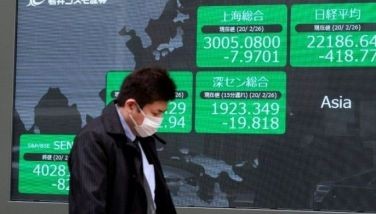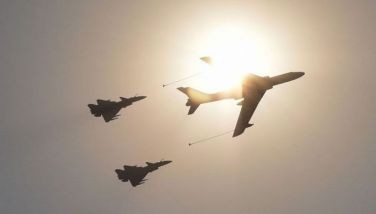Russia warns Ukraine over 'lawlessness' in east
KIEV — Ukraine's foreign minister said yesterday that his country was practically in a state of war with Russia, as Moscow further ratcheted up pressure on Kiev, claiming that Russian-leaning eastern regions have plunged into lawlessness.
Russian forces have effectively taken control over Ukraine's Crimean Peninsula in what has turned into Europe's greatest geopolitical crisis since the end of the Cold War. On Sunday the region is to hold a referendum on whether to split off and become part of Russia, which the West says it will not recognize.
"We have to admit that our life now is almost like ... a war," Foreign Minister Andrii Deshchytsya said before meeting his counterparts from Belgium, the Netherlands and Luxembourg. "We have to cope with an aggression that we do not understand."
Deshchytsya said Ukraine is counting on help from the West. Prime Minister Arseniy Yatsenyuk is to meet with President Barack Obama in Washington on Wednesday.
On yesterday, the Russian Foreign Ministry said lawlessness "now rules in eastern regions of Ukraine as a result of the actions of fighters of the so-called 'Right Sector,' with the full connivance" of Ukraine's new authorities.
Right Sector is a grouping of several far-right and nationalist factions whose activists were among the most radical and confrontational of the three-monthlong demonstrations in the Ukrainian capital, Kiev, which eventually ousted President Viktor Yanukovych.
The Kremlin statement also claimed Russian citizens trying to enter Ukraine have been turned back at the border by Ukrainian officials.
Pro-Russia sentiment is high in Ukraine's east and there are fears Russia could seek to incorporate that area as well.
Obama has warned that the referendum in Crimea would violate international law. But on Sunday, Russian President Vladimir Putin made it clear that he supports the vote, in phone calls with German Chancellor Angela Merkel and British Minister David Cameron.
"The steps taken by the legitimate leadership of Crimea are based on the norms of international law and aim to ensure the legal interests of the population of the peninsula," said Putin, according to the Kremlin.
On yesterday, Putin was briefed by Russia's foreign minister, Sergey Lavrov, on the contents of a document Lavrov received from Secretary of State John Kerry explaining the US view of the situation in Ukraine.
That document contains "a concept which does not quite agree with us because everything was stated in terms of allegedly having a conflict between Russia and Ukraine, and in terms of accepting the fait accompli," Lavrov said. The Kremlin contends Yanukovych was ousted by a coup.
Lavrov said Kerry had been invited to come to Russia to discuss the situation. "We suggested that he come today, I think, and we were prepared to receive him. He gave his preliminary consent. He then called me on Saturday and said he would like to postpone it for a while," the minister said.
In Washington, the State Department said it was still waiting to hear from Moscow whether it would accept a US proposal for negotiating an end to the Ukraine crisis.
A statement released yesterday said Kerry, in weekend discussions with Lavrov, reiterated Washington's demand that Moscow pull back its troops from Ukraine and end attempts to annex the Crimean peninsula. Kerry also called on Russia to cease what the statement described as "provocative steps" to allow diplomatic talks to continue.
Meanwhile, Obama spoke by telephone with Chinese President Xi Jinping late Sunday, trying to court China's support for efforts to isolate Russia over its military intervention in Ukraine.
Obama appealed to Beijing's vehement opposition to outside intervention in other nations' domestic affairs, according to a White House statement.
The US president "noted his overriding objective of restoring Ukraine's sovereignty and territorial integrity and ensuring the Ukrainian people are able to determine their own future without foreign interference," the statement said, adding that the two leaders "agreed on the importance of upholding principles of sovereignty and territorial integrity."
China has been studiously neutral since the Ukraine crisis began and it remained unclear whether China would side with the US and Europe or with Moscow.
The UN Security Council, meanwhile, met on Ukraine for the fifth time in 10 days to hear closed-door briefings from UN political chief Jeffrey Feltman and Ukraine's UN Ambassador Yuriy Sergeyev. The council has been unable to take any action because Russia has veto power.
France's UN Ambassador Gerard Araud said the goal was to "send a message to the Russians. ... 'No referendum, you have to respect the Ukrainian constitution and negotiate.'"
In Kiev, Mikhail Khodorkovsky, the businessman and Putin critic who was once Russia's most famous prisoner, said yesterday his country is ruining its longstanding friendship with Ukraine.
"The question of Crimea's fate is very painful both for Ukrainians and for Russians. It's not just a simple territorial dispute for some extra square kilometers," Khodorkovsky told a packed hall at Kiev Polytechnic University.
"For Russians, it's a sacred place, an important element in our historical memory and the most painful wound since the Soviet collapse," Khodorkovsky said. Nevertheless, he said, the symbolism of Crimea for Russians cannot justify "such a blatant incursion into the affairs of a historically friendly state."
He called for Crimea to remain part of Ukraine, but with broader regional powers and the protection of the rights of Russian speakers there.
Khodorkovsky, once Russia's wealthiest man, was pardoned last December by Putin. Many believe he was convicted of tax violations and other crimes and sent to prison on trumped-up charges.
On Sunday, Khodorkovsky almost wept as he urged a large crowd in Kiev's center not to believe that all Russians support their government's actions in Crimea.
- Latest
- Trending




























